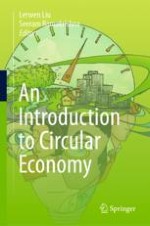2021 | OriginalPaper | Buchkapitel
Life Cycle Thinking in a Circular Economy
verfasst von : Shabbir H. Gheewala, Thapat Silalertruksa
Erschienen in: An Introduction to Circular Economy
Verlag: Springer Singapore
Aktivieren Sie unsere intelligente Suche, um passende Fachinhalte oder Patente zu finden.
Wählen Sie Textabschnitte aus um mit Künstlicher Intelligenz passenden Patente zu finden. powered by
Markieren Sie Textabschnitte, um KI-gestützt weitere passende Inhalte zu finden. powered by
